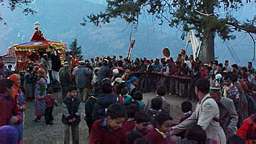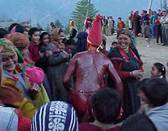Basant Panchmi is celebrated with great vehemence in various temples
 of Kullu. At Naggar, it is celebrated in Krishna
Temple
of Kullu. At Naggar, it is celebrated in Krishna
Temple  which is at a distance of 1km from Naggar
Castle
which is at a distance of 1km from Naggar
Castle  .
.
 People
of the nearby villages assemble in the temple complex and participate
in the pooja ceremony. The idols of Saligram, Hanumana and Garuda
are carried in a palanquin up to a chariot adorned with colorful
clothes and flowers. Thereafter, the chariot procession is held
around the temple complex.
People
of the nearby villages assemble in the temple complex and participate
in the pooja ceremony. The idols of Saligram, Hanumana and Garuda
are carried in a palanquin up to a chariot adorned with colorful
clothes and flowers. Thereafter, the chariot procession is held
around the temple complex.
The festival is celebrated to call to mind 'Bharat Milaap' (the
meeting of Lord Rama and his younger brother Bharata). The priests
play the role of Rama and Bharata.
In the epic Ramayana, Rama was exiled for a period of fourteen
years. When exile ended and Rama returned to Ayodhya, Bharata
handed over the crown to him. For those fourteen years, he had
been worshipping Rama's 'khadaun' (wooden soled sandals) by placing
them on his throne. People of Ayodhya celebrated the day with
great pomp and show. They showered color on each other.

 The
same act is carried out at the temple complex. One of the main
attractions of the festival is Hanumana (a character in Epic Ramayana,
monkey chief who was Lord Rama's ally in his invasion over Lanka).
The role of Hanumana is also performed by a person whose whole
body is smeared with saffron color and he puts on a conical cap
and a tail. He performs the traditional activities and accepts
the religious offerings made by the people. As the chariot procession
comes to an end, he plays around with the people gathered and
smears them with color.
The
same act is carried out at the temple complex. One of the main
attractions of the festival is Hanumana (a character in Epic Ramayana,
monkey chief who was Lord Rama's ally in his invasion over Lanka).
The role of Hanumana is also performed by a person whose whole
body is smeared with saffron color and he puts on a conical cap
and a tail. He performs the traditional activities and accepts
the religious offerings made by the people. As the chariot procession
comes to an end, he plays around with the people gathered and
smears them with color.
The children are the most amused as they are chased all around
the temple complex. The festival concludes by the end of the day.
Bharat Milaap symbolizes the love and reverence that the youngers'
have for their elders. Such noble Indian ethics have kept the
joint family system alive and strengthened the bonds of family.

